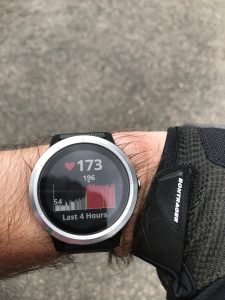Nothing gets my heart pumping like cycling to help find a cure for Type 1 Diabetes.
I’ve started to ramp up my training for our Logistics Leaders for Type 1 Diabetes Cure team ride in support of JDRF, which will be in Santa Fe, New Mexico on November 3, 2018. Our team members are also hitting the road, including Ralph Cisneros (Intel) and Joe Tillman (TSquared Logistics):
It’s not too late to sponsor or join our team. If you enjoy cycling, have a connection to T1D, or just want to take on a personal challenge for a great cause, please contact me for more info. Or if you want to make a donation to support one of our team members, just visit our team page and click on their name.
And now, here’s the supply chain and logistics news that caught my attention this week:
- Wanted: Hundreds of Entrepreneurs to Start Businesses Delivering Amazon Packages
- XPO Logistics Adds Augmented Reality to the Last Mile Experience
- Walmart-Led Blockchain Effort Seeks Farm-to-Grocery-Aisle View of Food Supply Chain (WSJ – sub. req’d)
- Descartes Acquires Velocity Mail
- Oracle Extends Cloud-based Warehouse Management to Give Customers Enhanced Logistics Performance and Global Inventory Visibility
- Self-driving car startup Nuro teams up with Kroger for same-day grocery delivery (TechCrunch)
- Pizza Delivery Gears Up for a Driverless Era (WSJ – sub. req’d)
- Volvo Trucks and FedEx Successfully Demonstrate Truck Platooning on N.C. 540
- German platooning trials start (Logistics Manager)
- Flowspace Raises $2.2M to Fuel Growth of National, On-Demand Warehousing Business
- Roambee raises $2 million to secure internet of things supply chain (VentureBeat)
- FMCSA: Hours violations have ‘dropped significantly’ under ELD mandate (CCJ)
Risky Business? Startups to Deliver Packages for Amazon
What do you do when demand for package delivery outstrips capacity? In Amazon’s case, the company has been investing for years in it’s own delivery assets and capabilities to augment those of UPS, USPS, FedEx, and other partners (see Amazon: Disruptor or Distraction?). But those investments have not been enough to keep up with demand, so now Amazon is offering entrepreneurs the opportunity to launch their own delivery businesses. Here are some excerpts from the press release:
Amazon will take an active role in helping interested entrepreneurs start, set up and manage their own delivery business. Successful owners can earn as much as $300,000 in annual profit operating a fleet of up to 40 delivery vehicles. Individual owners can build their business knowing they will have delivery volume from Amazon, access to the company’s sophisticated delivery technology, hands-on training, and discounts on a suite of assets and services, including vehicle leases and comprehensive insurance.
The offering provides technology and operational support to individuals with little to no logistics experience the opportunity to run their own delivery business. To help keep startup costs as low as $10,000, entrepreneurs will also have access to a variety of exclusively negotiated discounts on important resources they’ll need to operate a delivery business. The deals are available on Amazon-branded vehicles customized for delivery, branded uniforms, fuel, comprehensive insurance coverage, and more.
“We have great partners in our traditional carriers and it’s exciting to continue to see the logistics industry grow,” said Dave Clark, Amazon’s senior vice president of worldwide operations. “Customer demand is higher than ever and we have a need to build more capacity.”
Amazon makes it sound so easy and lucrative, but I’ve never heard anyone who’s been in the delivery business characterize it in those terms.
This is basically a franchise model, with Amazon helping to lower the upfront costs and risks for entrepreneurs. Although Amazon’s current growth can arguably support a local delivery business today, what about 5 years from now, or 10 years from now? In other words, does it make sense to build a delivery business that’s completely dependent on a single customer for growth and revenue?
Amazon also makes the point that logistics experience is not required. I would argue that if you don’t have any experience in managing a logistics operation, your first hire should be a partner who does. Relying solely on Amazon to provide that knowledge and experience from afar is too risky in my opinion.
That said, I believe this will be a great opportunity for entrepreneurs who have the right skills and knowledge, and who are in the right markets. For others, opening up a McDonald’s or Dunkin’ Donuts might be a better bet.
Groceries and Pizza Delivered via Driverless Cars
While you’re filling out your application to start an Amazon package delivery business, pause for a moment and think about what role driverless cars might play in the future in local delivery.
An article by Tim Higgins in the Wall Street Journal this week highlights how Domino’s Pizza and Pizza Hut are testing driverless cars (from Ford and Toyota, respectively) to deliver pizzas.
“Most visions of driverless cars have highlighted robot taxis,” Higgins writes, “but many experts are starting to see around-town deliveries as an especially promising arena for driverless cars, and it may even develop sooner than robot taxis.”
Here’s an excerpt from the article:
The type of deliveries that are likely to be most common in the early days of driverless-vehicle service—along constant routes during off-peak hours and at slow speeds—reduce the complexity and risk of the autonomous driving, says Rasheq Zarif, a consultant and former head of business innovation at Mercedes-Benz Research & Development North America, in Silicon Valley.
In related news, Nuro, an autonomous vehicle startup focused on local deliveries, has partnered with grocery retailer Kroger to offer same-day deliveries. As reported in TechCrunch:
Nuro’s intent is to use its self-driving technology in the last mile for the delivery of local goods and services…Nuro has two compartments that can fit up to six grocery bags each…Throughout the pilot program [with Kroger, to be launched this fall], Nuro will be looking to see how accurate its estimated delivery times are, how the public reacts to the vehicles and how regular, basic cars interact with self-driving ones.
There’s still a lot more development and learning that needs to take place, but it’s clear that the future of delivery will be much different tomorrow than what exists today, and it will likely involve driverless vehicles in some capacity.
A White Space in TMS: Mail and Parcel Shipment Scanning and Tracking
For several years now, Descartes Systems Group (a Talking Logistics sponsor) has been acquiring technology companies with solutions that address the white spaces of transportation management — that is, solutions that help automate and streamline processes that have generally been ignored or dismissed by other leading transportation management system (TMS) providers.
The latest example is Descartes’ acquisition of Velocity Mail, “an electronic transportation network that provides global air carriers with mail and parcel shipment scanning and tracking solutions.” The purchase price was $25.5 million in cash.
Here are some details from the press release:
Velocity Mail has been connecting commercial airlines and their logistics partners with government postal authorities around the world for more than 15 years. Using Velocity Mail’s network, global air carriers leverage mobile devices to accurately track shipments and deliveries in real-time. Velocity Mail automates the entire shipment process from route generation to accounting reconciliation, simplifying operational processes for the air carriers, ground handlers and postal authorities.
“With more than 60% of cross-border ecommerce transactions shipped using postal providers, the growth of ecommerce has fuelled an increase in the market for Velocity Mail’s solutions,” said Ken Wood, EVP of Product Management at Descartes.
Another opportunity created by the rapid growth of cross-border e-commerce.
And with that, have a happy weekend!
Song of the Week: “Brand New Day” by Trevor Hall














